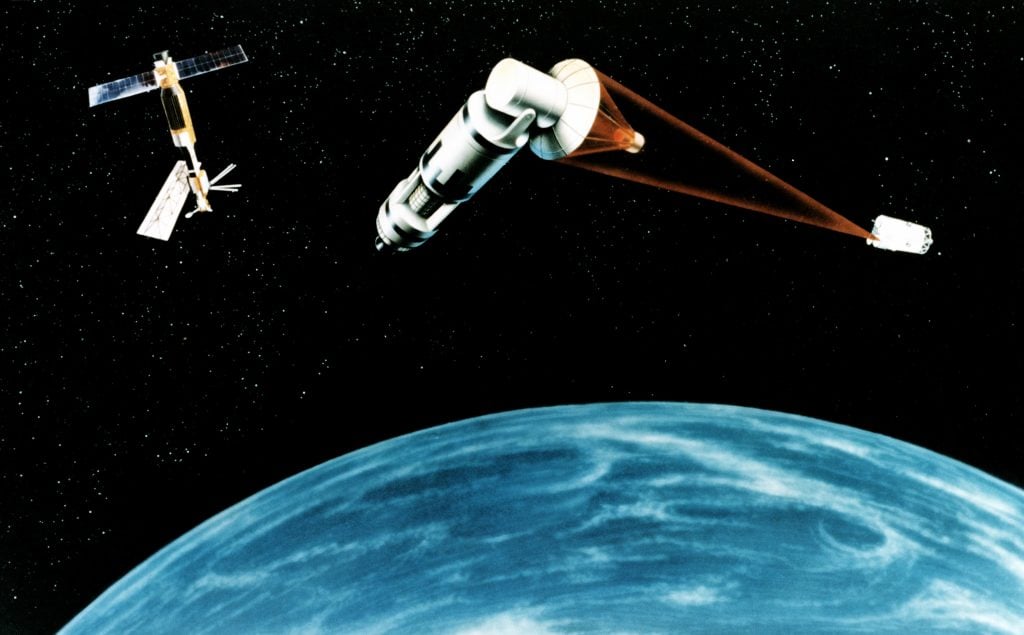
PENTAGON: The Air Force has eked out a victory in the Pentagon’s latest proposal for a Space Force. While many in the Air Force would prefer to keep their current preeminent role in space operations and not create a new service at all, the current plan — to be submitted by year’s end for inclusion in the 2020 budget request — keeps the Space Force under the Air Force Department, rather than making it fully independent.
The plan calls for the force to be led by a chief of staff who would also serve on the Joint Chiefs of Staff, giving space operations a major seat at the table in strategic deliberations by the powerful chiefs.
Deputy Defense Secretary Patrick Shanahan has said he wants the command to remain lean, with a small staff pulled from existing offices across the armed services, in order to spend as much money on technology — and as little on overhead — as possible.
But while embedding the Space Force within the Air Force “is preferable to a completely separate Department, it will still cost money without any direct contribution to improving U.S. military offense/defense on-orbit,” said David Deptula, dean of the Mitchell Institute and retired Air Force three-star general. Everything the force will do “is already happening today inside the Air Force,” he added.
The plan was initially reported by Defense News and confirmed by a defense official.

The state of play in military space
The military space sector is evolving fast. Get the latest from Space Force and industry officials on what’s next for acquisition, policy and training in a new Breaking Defense eBook.
Making the Space Force subordinate to the Air Force “is the easiest and least expensive approach,” said Mark Cancian, a senior advisor with the Center for Strategic and International Studies. But inexpensive isn’t free, and Cancian sees issues ahead: “Ultimately, I think the Air Force will hang onto some of its space structure, so the Space Force will have to recreate it, and the new service will want its own boot camp, school system, doctrine command, acquisition command, recruiting force, etc. so the cost will be in the middle” of the widely varying estimates.
The Air Force officially estimated the cost of creating an independent Space Force at $13 billion, though outside experts questioned its count. A recent study conducted by Todd Harrison of CSIS found that, while a new Space Force would run between $11 billion and $21 billion per year — depending on how vast the restructuring is — 96 percent of that total is already being spent by the Pentagon on space operations.
In all, new costs would likely run be between $300 and $500 million per year, about the same as the $413 million the Pentagon spent on its first-ever audit — which it failed — this year.
After bitterly resisting the Space Force proposal back when it came from Congress, Pentagon leadership reversed course when Trump endorsed the idea and is all in on the current plan.
“Space is critical for us,” under secretary for acquisition and sustainment Ellen Lord told a small group of reporters this week. “It’s a warfighting domain that’s critically linked to all the other domains, and we are moving forward to make sure we consolidating all the efforts in space across the department.”
Deptula does see big upsides to establishing a Space Force despite misgivings about its price tag. “Other than rearranging chairs on the fourth floor E-ring of the Pentagon, the one valuable outcome of this proposal is that it would add another voice to the Joint Chiefs of Staff” with perspective of the role space plays in all operations across the globe.”
The idea will still have to make it through Congress. Senate Armed Service chairman James Inhofe has said the Space Force isn’t on his priority list for 2019 “because I don’t think we need it.” His concerns revolve around the duplication of effort with existing offices, and the overall cost.
Whatever it costs, the Space Force will need to find room in a defense budget that itself is very much in flux. The Pentagon’s original plan for a $733 billion budget was reduced in October to $700 billion by the White House, until President Trump was convinced by outgoing Defense Secretary Jim Mattis this month to push it back up to $750 billion.
It’s unclear what impact Mattis’ resignation on Thursday, submitted as protest to Trump’s announcement of troop withdrawals from Syria and Afghanistan, will have on the administration’s thinking. But with Mattis a lame duck, and budget and deficit hawk Mick Mulvaney running the Office of Management and Budget, the possibility exists for another course correction.
Correction: Due to an error on the part of the editor (not Paul), the original version of this story misstated the relative cost of the Space Force and the 2018 DoD audit. The article is now corrected.